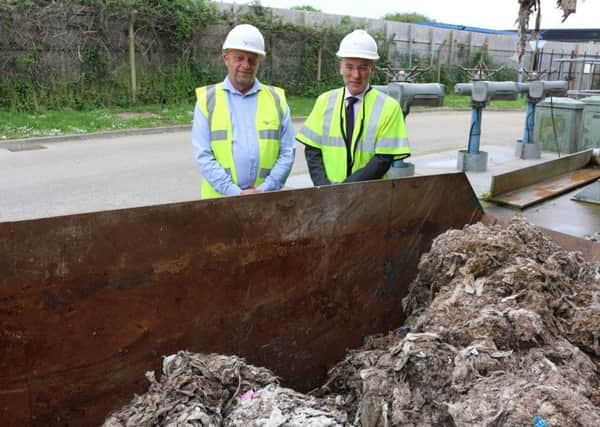Working hard to clean up waste water


That’s the message from officials at Southern Water, which took The News on a tour around its sprawling wastewater treatment plant at Budds Farm in Havant.
It follows heavy criticism earlier this year when more than 5,500 people signed a petition asking the Worthing-based water company to stop ‘polluting’ Langstone Harbour.
Advertisement
Hide AdAdvertisement
Hide AdHayling campaigner Mark Coates went as far as to suggest that the Environment Agency should take away its permit.
It’s not difficult to understand people’s frustration, considering the headlines in recent years.
Five years ago Southern Water was fined £150,000 for a number of illegal ‘discharges’ – or releases – into Langstone Harbour, which is a Site of Special Scientific Interest.
And last year the company was fined £160,000 after 40m tonnes of sewage was pumped into the sea from the East Worthing Wastewater Treatment Works in 2012.
But that was then and this is now, stress officials.
Advertisement
Hide AdAdvertisement
Hide AdSome £30m has been spent on upgrades, including rebuilding Fort Cumberland, in Eastney, which pumps untreated wastewater to Budds Farm for treatment. (Budds Farm then pumps the treated wastewater out to sea via a three-mile pipe).
And the city’s sewers have been improved significantly so that rainfall is pumped directly into the sea during storms, rather than mixing with the sewage and potentially overloading the system.
This has reduced the burden on Fort Cumberland and Budds Farm by a third and has significantly lessened the chance of any releases during storms.
But there will still be times when screened sewage has to be released to stop homes being flooded, says Paul Kent, environment and wastewater strategy manager.
Advertisement
Hide AdAdvertisement
Hide AdHe says: ‘During heavy rain, we have to store water on site in storm tanks.
‘Before any of that happens there’s 18 Olympic swimming pools-worth of stormwater storage held on.
‘Once the rain subsides, that’s pumped back into the system for treatment.
‘There’s a bit of a misconception that when it rains we indiscriminately release into the harbour.
‘There’s a set of measures we have to go through.
Advertisement
Hide AdAdvertisement
Hide Ad‘This is the permitted and consented method of dealing with wastewater.
‘If we didn’t release excess flows into the harbour, homes would flood.
‘It’s the bath analogy – if we didn’t have this release valve, then flows would back up in the system and the city would flood.
‘Bearing in mind most of Portsmouth city is below sea level and one of the densest conurbations in our area, it would be catastrophic if there was flooding.’
I ask whether these releases could be avoided altogether.
Advertisement
Hide AdAdvertisement
Hide AdMr Kent says: ‘The way to do that would be to build more storage.
‘Our consents from the EA don’t require us to do that. The vast majority of the time the storage will be adequate.’
Anything that is released into the harbour during storms is heavily diluted, stress officials.
Mr Kent says ‘raw sewage’ can be a misleading term because wastewater is only around three per cent human waste.
Advertisement
Hide AdAdvertisement
Hide AdMost of it is from sinks, washing machines, and includes toilet water.
Far from being ‘raw sewage’, Mr Kent highlights that during a storm anything released from the storm tanks is 99.9 per cent untreated wastewater, with 0.1 per cent human waste.
Mr Kent says every customer flushing their toilets has a responsibility to the environment.
Only the three Ps – poo, pee and (toilet) paper – should be flushed.
Advertisement
Hide AdAdvertisement
Hide Ad